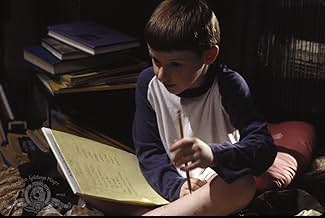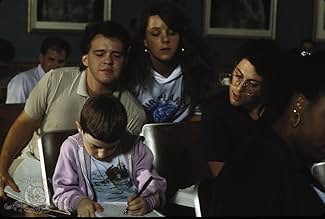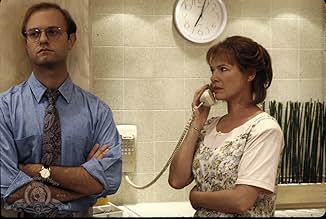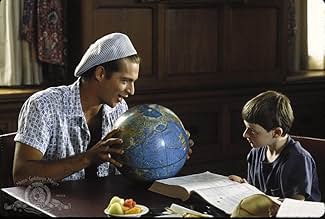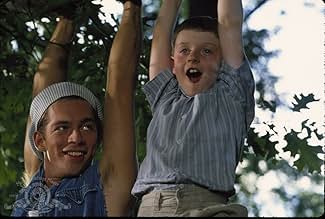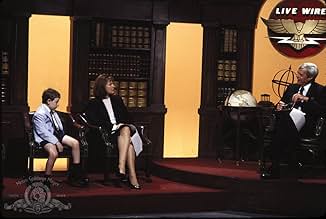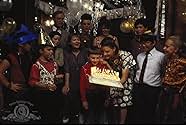Una madre soltera cría sola a un niño prodigio, luchando por darle todas las oportunidades que necesita para expresar su don.Una madre soltera cría sola a un niño prodigio, luchando por darle todas las oportunidades que necesita para expresar su don.Una madre soltera cría sola a un niño prodigio, luchando por darle todas las oportunidades que necesita para expresar su don.
- Dirección
- Guionista
- Elenco
- Premios
- 2 premios ganados y 1 nominación en total
- Garth
- (as David Pierce)
- Dirección
- Guionista
- Todo el elenco y el equipo
- Producción, taquilla y más en IMDbPro
Opiniones destacadas
They share similar problems in classrooms; namely, the tendency to be bored, frustrated and/or disruptive. It's not easy being either too advanced or slow.
"Little Man Tate" dramatizes the plight of a "super-gifted" seven-year-old, subtly played by Adam Hann-Byrd. Little Fred Tate must cope not only with normal problems of childhood but also his extraordinary mental gifts which set him far apart from fellow children his age.
After feeling a lack of empathy from his mother (caringly portrayed by Jodie Foster) and his teacher-mentor (sensitively executed by Dianne Wiest) Fred reaches out to a college student who befriends him. Unfortunately, that relationship comes to a disappointing end when the older chum tells him that he must seek out kids his own age.
Scott Frank's script may have its peaks and valleys, yet its heart's in the right place, and he concludes his little drama on a happy (if tidy) note. Jodie Foster directs with concern and reveals genuine promise.
The story is of Fred Tate, son of single mother Dede. It's found that, at the age of 2, Fred can already read the print on the bottom of a dinner plate. Dede, and the rest of the world, realize that Fred is a genius, but Dede is determined that Fred, while given ever opportunity to expand his gift, is not exploited by the well meaning, but pretentious head mistress of a school for gifted children, Jane Grierson, portrayed by the outstanding actress Dianne Wiest.
The story's told, mainly, through the eyes of Fred; however, we also see the viewpoints of Dede & Jane who each feel that she alone has Fred's best interests at heart. We are given tremendous insight into how Fred sees and relates to the world around him. He has the understanding that's beyond most adults but only the emotional experience of his 7 years of life.
Through Fred, we can see that the academic world of gifted children isn't just filled with the nice, polite, precocious, bespectacled children that we are often shown on news magazines or public television programs. We are allowed to see that some are as outright rude and pretentious as the adults who claim to be only nurturing their gifts.
In her feature-film directorial debut, Foster is able to capture the world as Fred sees it. She's able still allow us to see Fred as the youngster he is. Fred's intellect isn't the basis of the story, just one element in it. She lets the story do the work, and she let's the character's tell the tale. She allows the characters to be real people not just the stereotypes that so often are found in films dealing with this subject matter.
Jodie Foster's only directed two films since this one ("Home For The Holidays"-1995 & "Flora Plum"-2005), and I've seen "Home For The Holidays" which I also feel was very well done. It seems that Ms. Foster is being very careful in picking her projects, much like the late Stanley Kubrick did. I only hope her unique talents are recognized and she's given more green lights for future projects.
To be fair, the movie looks little more than a better-than-average TV movie, but is elevated by its director's star turn in front of the cameras, plus some neat little (that word again!) directorial flourishes, like a slow cutaway into the distance of Foster's workaday waitress Dee Tate's mother/son dance with young son Fred and at other points interesting suffusions of light and animation to perhaps demonstrate the surging thought process of the precocious infant.
The narrative gets a little skewered as Fred is adopted by a wealthy philanthropist female, childless naturally, whose feelings quickly move from professorial to matrimonial and a too obvious conflict with Foster's more down-home mother love. Some of the situations are a little too pat also, for instance the way that Fred cleaves to older boys, one a maths prodigy himself, the other a piano-playing college boy (played by a young Harry Connick Junior), the lad obviously groping emotionally for a male bonding relationship with his natural father nowhere around.
Freak occurrences too like Connick's initial encounter with Fred (symbolically dropping the whole world on his shoulders!) and a side-lined Foster's rescue of a drowning child just as Fred's making an appearance at the professor's side on national TV also jar credulity a little and of course sentimentality rears its largely unwelcome head before the happy ending, but I'm perhaps being too severe on what is when all is said and done, a warm, family entertainment on an off-beat subject.
I will be honest, this could have been better and deeper, but Jodie Foster didn't want it to and so she winds up being the Virgin Mary in this movie. I know that doesn't make a lot of sense here, but if you see it you'll understand. Perhaps she is becoming an egotist. Still, between Revenge of the Nerds and this, I'll take this.
Overall, not necessary viewing, but you could do worse. 3 out of 5 stars.
Fred (Adam Hann-Byrd) is a very special little boy. He is able to play complicated musical pieces, pen deep and meaningful poems, calculate complex mathematical problems at an age when his classmates are still learning to tie their shoes and mastering their alphabet. He's a child old before his time, capable of thoughts far beyond the average adult's understanding, but at the core of it all, he is still just a seven-year-old who wants to fit in at school and have friends. His mother Dede, played by Jodie Foster, determines the best way to raise her beloved son is to treat him like any other child to the extent that she never really acknowledges his gifts, whereas Jane Grierson (Dianne Wiest) is on the other end of the scale as a psychologist whose speciality is gifted children. Jane takes an interest in Fred, believing his intelligence must be nurtured even if it means plonking a tot of seven into a university full of young adults.
Jodie Foster and Dianne Wiest deliver strong, solid performances as two women who both love this child and just want what is best for him, even if their approaches are very different. However, it is Adam Hann-Byrd who steals the show as the lead character of Fred. He depicts the brilliance of the character as well as his awkwardness in dealing with both 'normal' contemporaries and fellow gifted children. He is wonderful in showing how Fred is just a kid who wants to be liked, and how he desperately needs the adults around him to provide him a balance between being treated like the seven-year-old he is while allowing his towering intellect to thrive.
This film takes us into the heart of what it is to be a child prodigy and how it can be both a gift and a curse. We see Fred surpassing his adult classmates in his university course yet he struggles to interact with peers his own age who are of average intelligence. Through him, it is easy to see that being perceived as 'normal' can be the greatest gift of all. It also highlights the abysmal state of the state education system in teaching such children.
I really recommend this film as it delivers this fascinating story in a manner that is bittersweet, touching and, at times, humorous. The characters are all interesting and likable and you can't help but feel for Fred's joys and woes.
¿Sabías que…?
- TriviaJodie Foster asked David Hyde Pierce to appear in the film after remembering him from college. They both attended Yale University.
- ErroresThere are several errors in simple mathematics in the movie: Firstly, Damon "The Mathemagician" Wells correctly states that there are 25 228 800 minutes in 48 years (but 25,246,080 minutes if one counts the 12 leap-days that would occur in any span of 48 years that doesn't include a century year - only century years evenly divisible by 400, like 2000 but not 1900, are leap years), then says that this is 151 368 000 seconds. This is clearly wrong as 25 228 800 x 60 is 1 513 728 000 (more than 10 times as much). Furthermore, Fred says that the cube root of 3 796 466 is 156 although 156*156*156 is 3 796 416.
- Citas
[last lines]
Fred Tate: I once got this fortune cookie that said, "only when all things around you are different will you truly belong". Well, we're all different that's for sure. I see Jane everyday at the institute, and once in while Dede let's her take us out to a fancy restaurant. Sometimes we even have fun. After a while I was the most famous kid at Jane's school. But then a year later, a 6 year old boy named Willie Yamaguchi got into law school, and suddenly I wasn't such a big deal anymore. But I don't care, because I was happy.
- Bandas sonorasI Get A Kick Out Of You
Words and music by Cole Porter
Performed by Ella Fitzgerald
Courtesy of Polygram Special Products
A Division of Polygram Group Distribution, Inc.
Selecciones populares
- How long is Little Man Tate?Con tecnología de Alexa
Detalles
- Fecha de lanzamiento
- País de origen
- Idiomas
- También se conoce como
- Little Man Tate
- Locaciones de filmación
- Upham Hall Miami University, Oxford, Ohio, Estados Unidos(The scene where Fred gets hit in the head with the globe was shot in front of Upham Hall)
- Productora
- Ver más créditos de la compañía en IMDbPro
Taquilla
- Presupuesto
- USD 10,000,000 (estimado)
- Total en EE. UU. y Canadá
- USD 25,010,896
- Fin de semana de estreno en EE. UU. y Canadá
- USD 230,106
- 14 oct 1991
- Total a nivel mundial
- USD 25,010,896
- Tiempo de ejecución
- 1h 39min(99 min)
- Color
- Mezcla de sonido
- Relación de aspecto
- 1.85 : 1


